The light industrial sector forms the backbone of Wisconsin’s economy, contributing significantly to industries like manufacturing, assembly, and logistics. In this fast-paced sector, staffing agencies play a critical role in connecting employers with the skilled labor force they need while offering job seekers a wide array of opportunities.
This blog will dive into the dynamics of the light industrial sector and explore how staffing agencies serve as a bridge between businesses and the workforce, ultimately driving efficiency and growth in Wisconsin.
Understanding the Light Industrial Sector
Light industrial work focuses on the production of smaller goods and parts, requiring manual labor, machinery operation, and strict adherence to safety protocols. Unlike heavy industry, which involves large-scale production and heavy machinery, the light industrial sector typically deals with smaller-scale manufacturing that demands precision, dexterity, and adaptability.
In Wisconsin, this sector is pivotal due to its broad range of industries, from food processing to electronics assembly. As such, maintaining a steady supply of skilled and adaptable workers is crucial to meeting the fluctuating demands of production schedules.
The Role of Staffing Agencies
Staffing agencies have become indispensable in Wisconsin’s light industrial sector, providing several key services that benefit both employers and job seekers. Let’s break down their primary roles:
1. Talent Acquisition
Staffing agencies maintain extensive pools of qualified candidates, making the hiring process faster and more efficient for employers. By leveraging their networks, agencies can quickly source the right talent, saving businesses from the lengthy traditional recruitment process.
2. Flexibility
In the light industrial sector, demand can vary significantly, requiring businesses to adjust their workforce accordingly. Staffing agencies offer flexible staffing solutions such as temporary, temp-to-hire, and permanent placements. This flexibility allows companies to scale their workforce up or down without the complexities of long-term employment contracts.
3. Compliance and Training
Ensuring workers are trained and comply with industry regulations is a top priority. Staffing agencies often provide pre-employment training, orientation, and ongoing support to workers, helping them adhere to safety standards and improve productivity on the job. This proactive approach promotes workplace safety and efficiency.
Advantages for Employers
Partnering with staffing agencies offers numerous benefits for employers in the light industrial sector:
1. Reduced Hiring Time
Time is money, and staffing agencies help employers fill vacancies quickly by pre-screening candidates and matching them to job openings based on specific requirements. This streamlined process reduces downtime and keeps production lines moving.
2. Cost Efficiency
Recruitment can be costly when you factor in advertising, interviewing, and training new hires. Staffing agencies handle much of this process, reducing overhead costs. Additionally, with temp-to-hire options, employers can evaluate a worker’s performance before committing to a permanent position, minimizing the risk of a bad hire.
3. Access to Skilled Labor
Finding the right fit for specialized roles can be challenging. Staffing agencies provide access to a diverse talent pool, ensuring that employers get candidates with the exact skills and experience needed for their unique operations.
Benefits for Job Seekers
Job seekers also stand to gain significantly from working with staffing agencies:
1. Diverse Opportunities
Staffing agencies offer access to a wide range of positions across various industries within the light industrial sector. Whether you’re looking for short-term assignments or a stepping stone to a permanent career, these agencies can open doors to numerous opportunities.
2. Career Guidance
Navigating the job market can be daunting, but staffing agencies provide support in building resumes, preparing for interviews, and even developing career paths. This guidance is invaluable for job seekers looking to make the right impression and advance their careers.
3. Flexible Employment
Many individuals prefer work that fits around their personal commitments, and staffing agencies cater to this need with temporary or temp-to-hire positions. This flexibility allows workers to balance their professional lives with other priorities, such as family or education.
How Staff Up Wisconsin Supports the Light Industrial Sector
At Staff Up Wisconsin, we’re committed to bridging the gap between employers and job seekers in the light industrial sector. Our expertise in recruitment and workforce management ensures that businesses can access the talent they need, and individuals can find rewarding opportunities that match their skills and aspirations.
By focusing on both employer and employee needs, we help create a thriving ecosystem where companies can grow, and workers can succeed. Our tailored approach to staffing means that we’re not just filling positions; we’re building careers and supporting businesses in achieving their goals.
Final Thoughts
In Wisconsin’s light industrial sector, staffing agencies play a vital role in keeping the wheels of industry turning. For employers, they offer an efficient, cost-effective solution to workforce management. For job seekers, they provide a gateway to diverse, flexible job opportunities and essential career support.
Whether you’re a business looking for top talent or an individual seeking your next job opportunity, Staff Up Wisconsinis here to guide you through the process and ensure success on both ends of the spectrum.
Need more information or ready to explore your staffing options? Reach out to Staff Up Wisconsintoday and let us help you achieve your goals in the light industrial sector.


Recent Comments